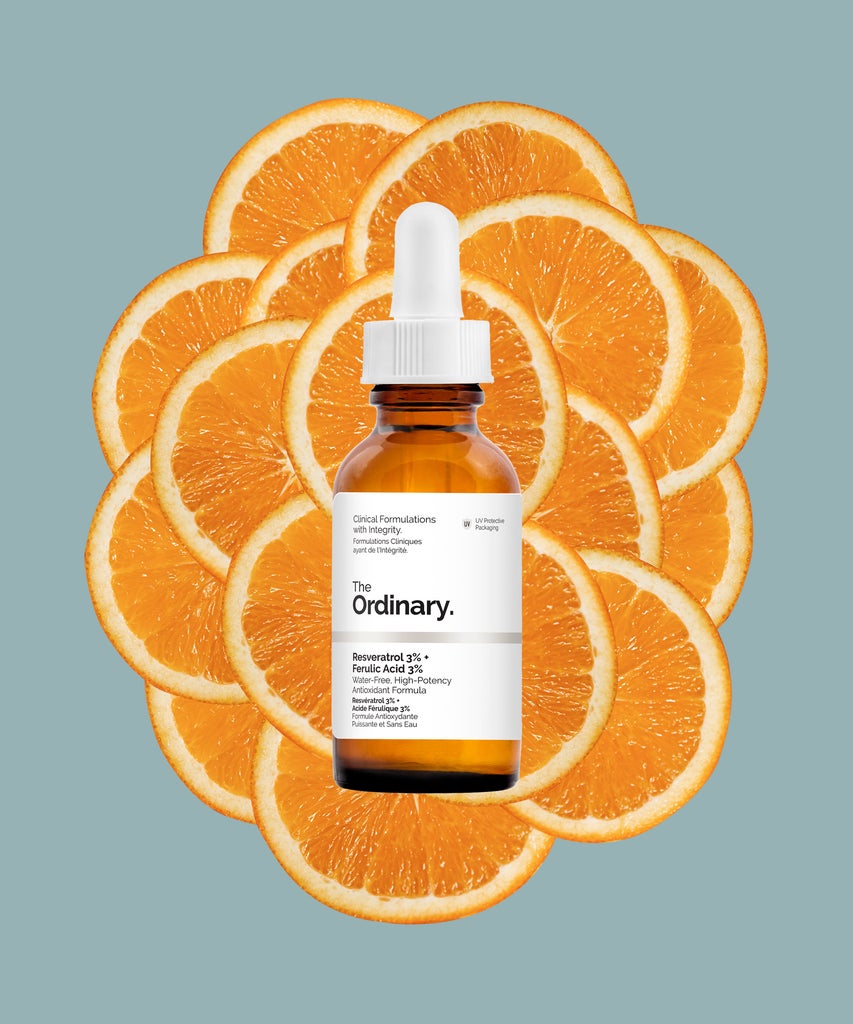
The environment has a lot to answer for when it comes to our skin. Thanks to elements such as pollution and UV rays, you might notice dullness, hyperpigmentation, fine lines and other bugbears over time, but antioxidants can help combat all of that. Working to shield skin from environmental factors, vitamin C is an antioxidant, as is ultra moisturising vitamin E. There’s another buzzy antioxidant ingredient worth knowing about, too. Enter: ferulic acid.
Of course, ferulic acid is nothing new and thanks to brands like SkinCeuticals and The Ordinary, it’s probably already on your radar. But unlike its popular counterpart vitamin C, it’s something of an unsung hero – not least because it has the power to make your skincare products work a hell of a lot harder. So how exactly should you use ferulic acid in your routine and is it right for you? Here’s everything you need to know about the little ingredient doing big things in skincare.
What is ferulic acid in skincare?
“Ferulic acid is a plant-based antioxidant found in the cells of rice, oats, apples and oranges,” explains Dr Parisha Acharya, skin expert and aesthetic doctor at Waterhouse Young Clinic. “It protects against oxidative stress (a disturbance which occurs in the skin) by neutralising free radicals,” essentially pollution and UV rays which fill the environment. Ferulic acid is usually found in skincare serums, which are a little more potent than moisturisers and penetrate the skin better.
What does ferulic acid do for skin?
The benefits of ferulic acid are mainly its antioxidant properties, says Dr Acharya. “It helps protect from environmental stressors that cause skin ageing,” she says. “It works to reduce the signs of ageing, such as fine lines and pigmentation (or dark spots) but it also improves firmness and illuminates the skin, helping to even out skin tone.”
How should you use ferulic acid in skincare?
Like antioxidant vitamin C and sunscreen, Dr Acharya recommends using ferulic acid daily and in the morning, as the daytime is when you’re more likely to come into contact with environmental aggressors. When exactly should it factor in? “Cleanse and tone as usual, then use your product containing ferulic acid and finish off with your SPF moisturiser,” says Dr Acharya.
Skin expert and facialist Lisa Harris concurs. “Ferulic acid works very well under SPF, as it increases protection against UVA and UVB rays,” she says. “I always advise my clients to apply an antioxidant serum, especially in hot sunny climates, as this will protect the skin of damage.”
Dr Acharya suggests investing in a serum in particular but mentions it should be stored in a dark cupboard away from heat and moisture, to prolong the potency. “To fully benefit from ferulic acid in skincare, I would recommend using a product that contains ferulic acid alongside other antioxidants such as vitamin C, E and resveratrol,” Dr Acharya adds.
Vitamin C is most popular and ferulic acid works particularly well with it. “Vitamin C isn’t very shelf-stable on its own and it degrades quickly, especially when exposed to sunlight,” says Harris. Ferulic acid actually helps stabilise vitamin C, prolonging your product. “It also improves the way it is absorbed into the skin and makes your vitamin C last longer on the skin,” continues Dr Acharya. In other words, ferulic acid and vitamin C are the dream team for glowing skin.
What are the best ferulic acid skincare products?
R29 rates Drunk Elephant’s C-Firma Fresh Day Serum, which contains the dynamic duo of 15% pure L-ascorbic acid (a powerful form of vitamin C) and 0.5% ferulic acid to firm and brighten the skin. Dr Acharya likes SkinCeuticals C E Ferulic, which combines vitamin C, E and ferulic acid for bolstered protection against the environment. Team with a high factor SPF, like Glossier’s new-and-improved Invisible Shield SPF 50, and you’re good to go in the morning.
If that’s a little out of your budget, The Ordinary’s Resveratrol 3% + Ferulic Acid 3% brings together antioxidant resveratrol (found in grapes) and ferulic acid. It’s slightly heavier than your typical serum but absorbs well, hydrates and sits perfectly under sunscreen and makeup.
Also try Dr. Dennis Gross Ferulic + Retinol Wrinkle Recovery Overnight Serum. This one is slightly different as it’s an overnight treatment thanks to retinol, which works better as part of a nighttime routine. Over time, it works to fade dark spots. If you use this, it’s really important to wear SPF 50 during the daytime (and to reapply regularly) as retinol can make skin very sensitive to sunlight. Another affordable option we love is the NIP+FAB Vitamin C Fix Concentrate Extreme 15%, which contains ferulic acid for an extra boost in efficacy.
Are there any side effects of ferulic acid?
According to Harris, some forms of ferulic acid are derived from oats, so if you are allergic to them, you could be sensitive to this particular source. “You should stop using any product containing ferulic acid if you develop any of the following side effects,” says Harris. “Redness, rash, hives, itchiness or skin peeling.”
Like what you see? How about some more R29 goodness, right here?
We Found The 8 Best Cleansers For Oily Skin